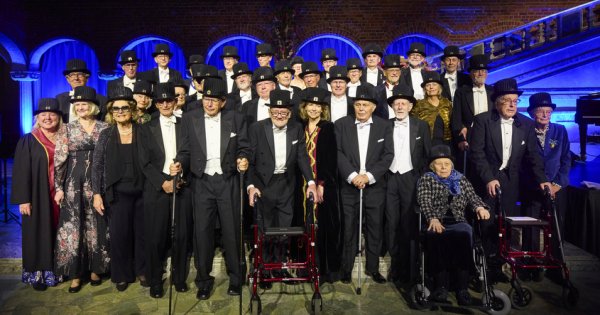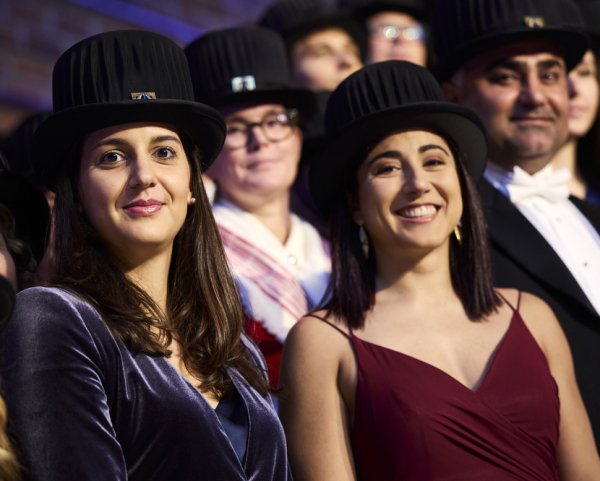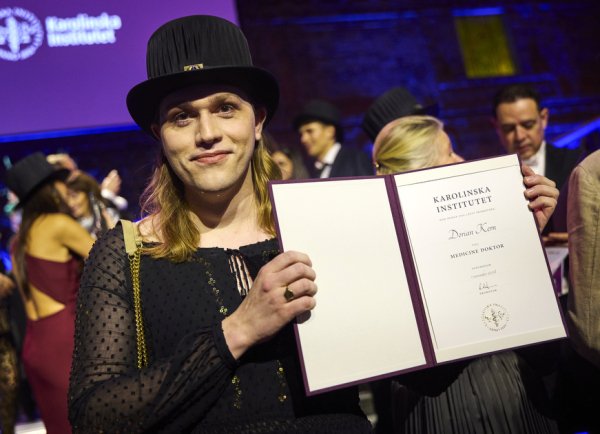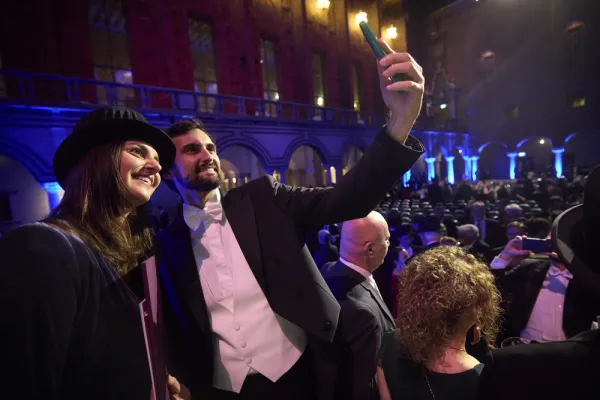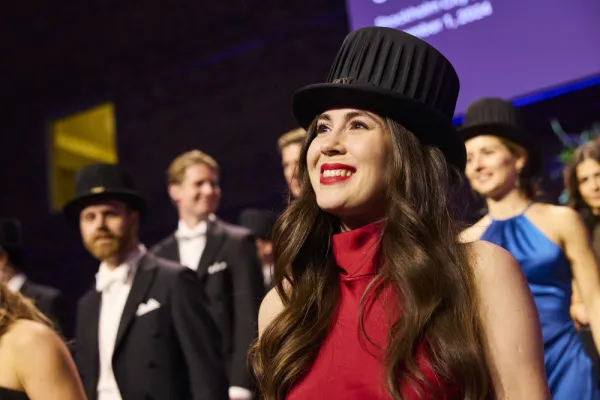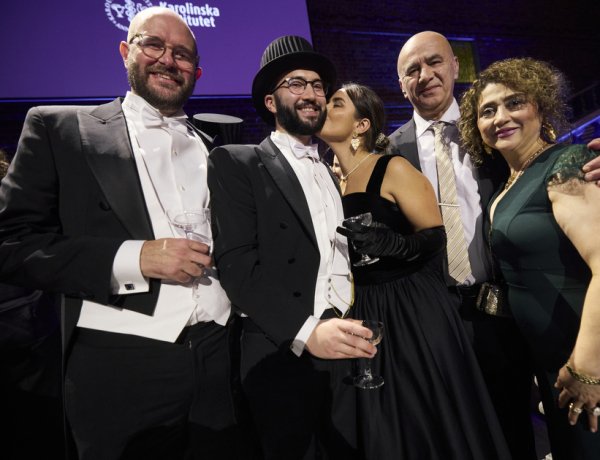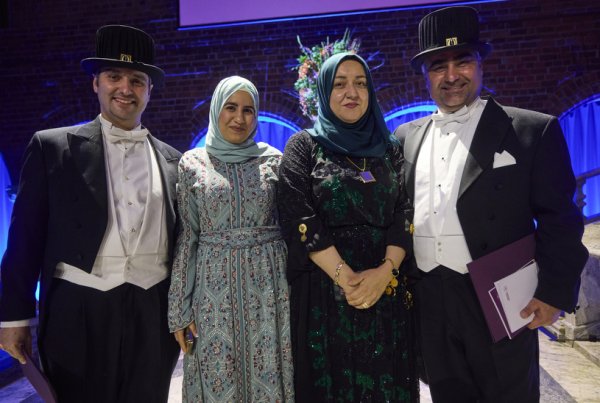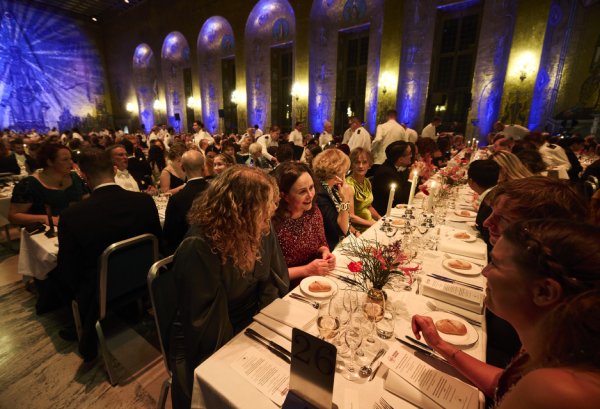The first storm of the autumn lashed Stockholm City Hall, harassing the flames of the outdoor candles and braziers, as the guests arrived to witness 133 doctors and a record 35 jubilee doctors receive their accolades at the KI conferment ceremony. It was an evening of celebration and joy, an evening of fresh opportunities and memories of a long career. It was, in short, a magical evening for the 900 or so guests assembled in the Blue Hall.
If the weather on 1 November was a study in grey, the guests made up for it in their resplendence, with silk ball gowns sparkling in red, pink and green standing in beautiful complement to the well-pressed dress coats and white shirt-fronts.
By the time the guests arrived, the evening's luminaries were already settled in their places in the Blue Hall, having gone through a final rehearsal in focused silence. But as the 700 or so family friends and colleagues trooped in, the room was quickly filled with loud, happy chatter.
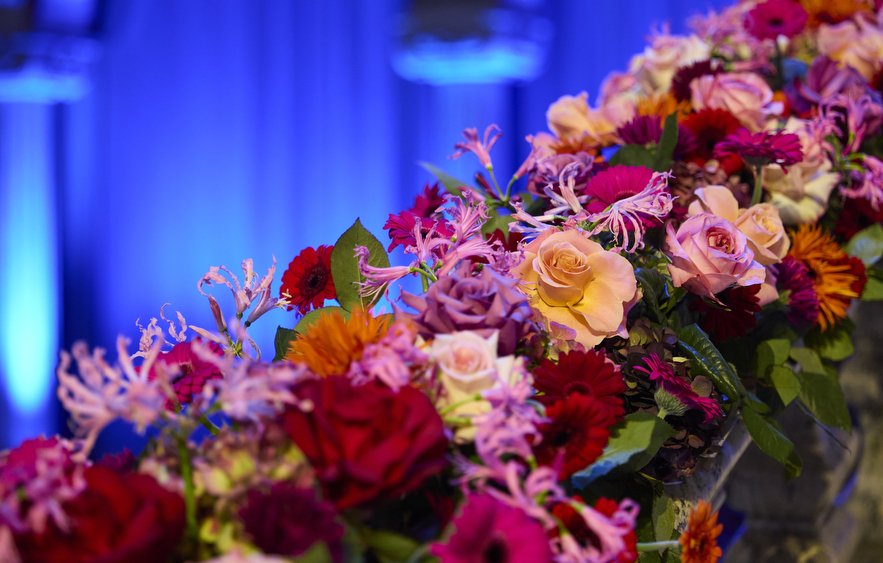
Here, participants from the age of 8 to 80-plus mingled in a sea of hugs and selfies as families and friends greeted "their" doctors until a given signal that sent everyone to their places to sit in an expectant silence that was finally filled with the sound of organ and trumpets.
The fluke that led to penicillin
The traditional grand conferment ceremony commenced with a procession led by standard-bearers along the Prince's Gallery, with the university management at the head followed by 133 promovendi and student ushers parading into the strains of Karolinska Institutet's ceremonial march.
Once the promovendi were seated, KI President Annika Östman Wernerson held a speech in which she likened the researcher to the explorers of the past, setting off into unknown territory with neither a map nor compass, propelled solely by curiosity and a belief in science and facts. She also professed the importance of basic research:
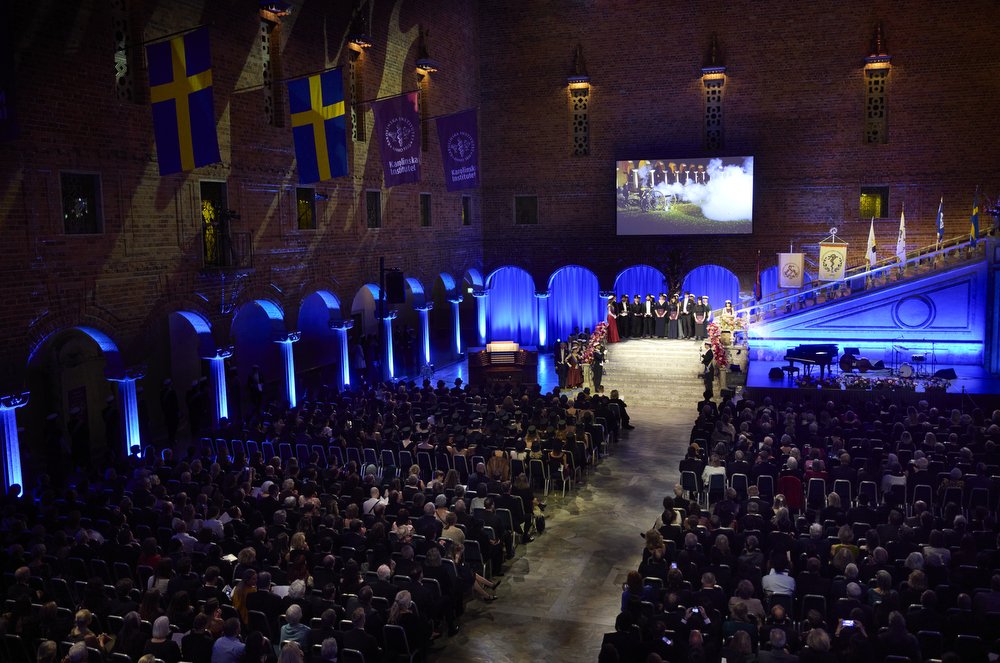
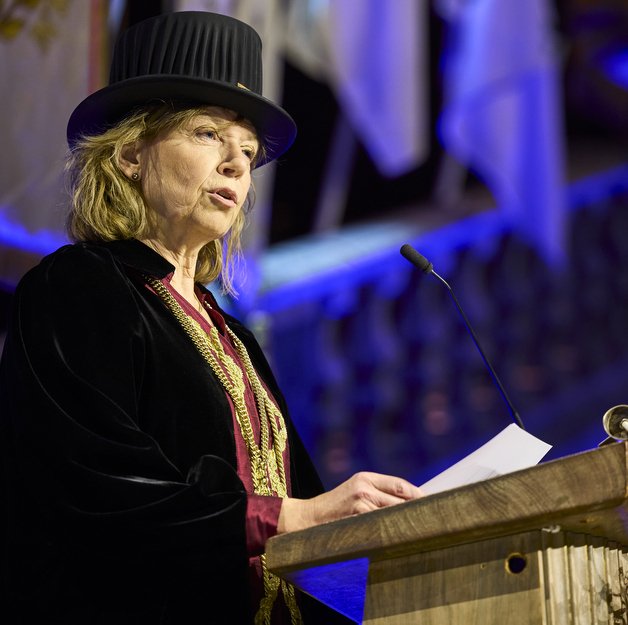
"'Chance favours the prepared mind" - thus did bacteriologist Alexander Fleming explain his decision not to discard the famous petri dish with its mouldy staphylococcus culture that led to the discovery of penicillin, one of the most important discoveries of the 20th century," she said. "History is full of examples of how the curiosity-driven pursuit of fundamental knowledge often gives rise to groundbreaking, unforeseen discoveries. This is, of course, why it's so exciting to be a researcher, a profession that I heartily recommend. The combination of passion, brilliance, collaboration and patience with long-term financing and academic freedom creates all the conditions needed to produce something of the utmost benefit to society."
Research is more important in the era of fake news
Professor Marie Arsenian Henriksson, conferrer and academic vice president for research, then presented the 35 new jubilee doctors who graduated over 50 years ago, declaring that in this era of fake news, research and facts are more important than ever.
The reason for the record number of jubilee doctors is that many doctoral students opted to graduate in 1974 when the degree procedures were amended. That year, 117 researchers earned their PhD at KI.
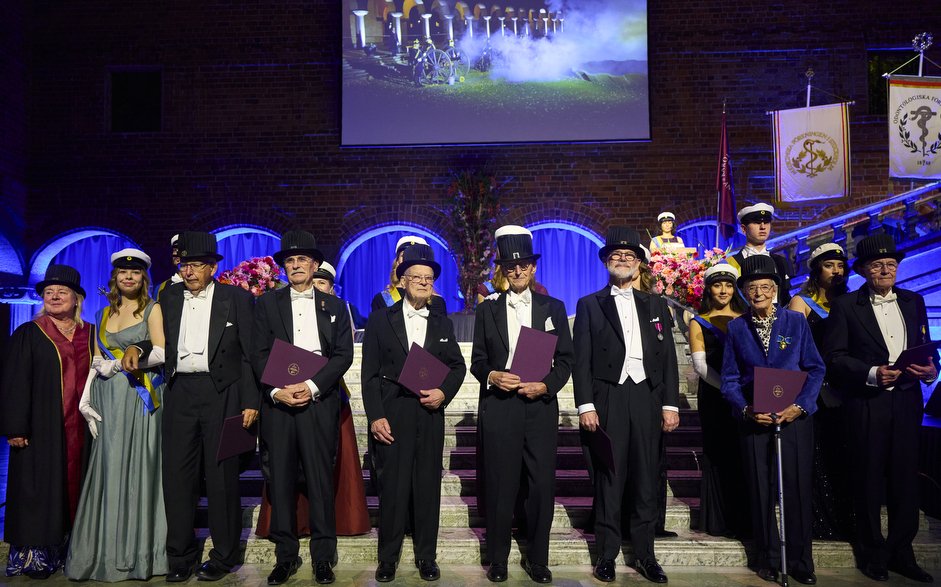
Every new jubilee doctor was greeted with loud applause, as the Gothenburg Artillery Division fired rumbling cannons outside to salute each group on the stage.
Proud of his doctoral students
During the pre-ceremony meet-and-greet, the experienced researchers expressed delight at being invited to the ceremony as well as a degree of surprise that 50 years had passed since they themselves sat here as new doctoral students.
"It's a huge thrill to be here meeting colleagues from back then, and looking at us, I think we've all aged pretty well," chuckled Leif Olgart, professor emeritus at the Department of Physiology and Pharmacology.
"Many old memories are awoken on an evening like this and you become aware of how KI has changed over these fifty years, as well as the conditions under which research is conducted, for good and ill," said Roland Möllby, professor emeritus at the Department of Microbiology, Tumour and Cell Biology. "Looking back at my career, I'm mostly proud of all the students I've turned into PhDs. This and all my amazing colleagues create lots of fond memories and make it great fun to be here tonight."
Ready for muggles and dementors
Following the jubilee doctors, Robert Harris, conferrer and academic vice president of doctoral education, opened the conferment of the new graduates with a speech in which, dressed in a wizard's hat and holding a magic wand, he compared the doctoral period at KI with Harry Potter's time at Hogwarts.
Professor Harris painted a picture of a time of experience and education that is magic yet no easy feat to partake of, and proclaimed that all 133 new doctors are now equipped to take their careers to new heights amongst muggles and dementors.
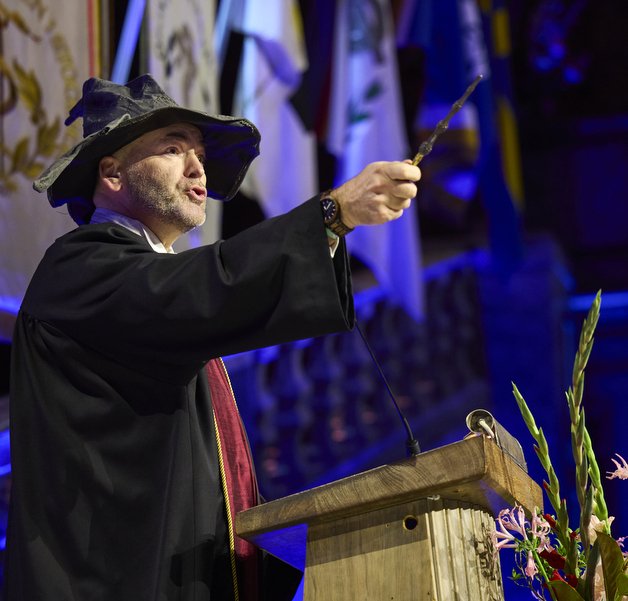
"You will work magic in your future careers, but if there's one thing I'd wish for, it would be that you take with you and nurture the friendships that you have made here at KI," he said. "Many of them will prove the most important in your lives. And that is also magic."
The promovendi then ascended the stage in groups of seven to receive their hat and diploma, each individual to the applause of the audience and each group to a cannon salute.
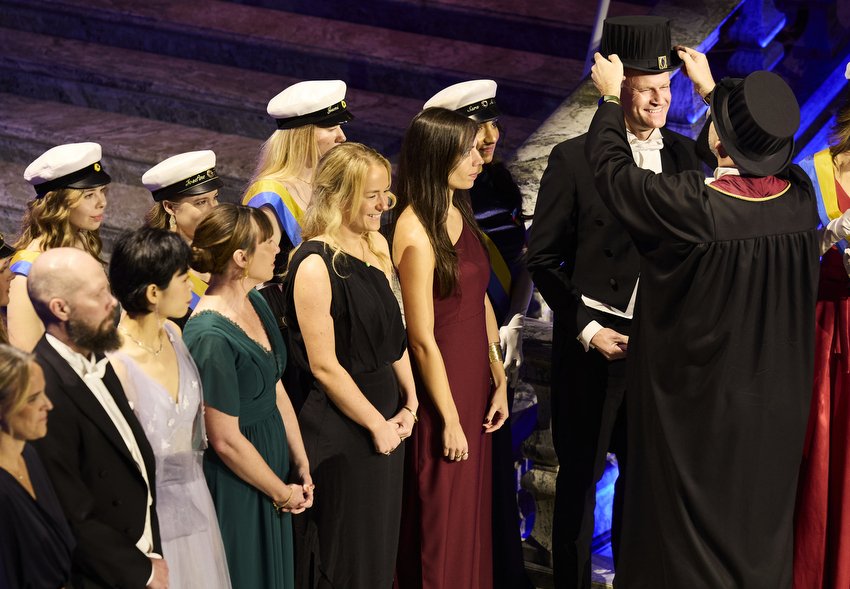
As the last doctor descended the stage, the university management initiated a standing ovation for all the evening's luminaries.
The professor's jubilee rap
Once the exiting procession of standard-bearers had concluded the ceremony, it was time for champagne toasts, more hugs and a three-course banquet in the Golden Hall before the dancing began (the text continues).
Jubilee doctor and Professor Emeritus Stephan Rössner, who was recently awarded KI's Silver Medal, held a thank-you speech during the dinner that provoked many memories and thoughts about the past and the present.
"In 1974, there were three very aged jubilee doctors sitting here in wheelchairs. Today, you see 35 energetic academics who have put down their golf clubs, bridge hands and last-minute tickets to Mallorca to be here with us today," he joked, and continued:
"When I graduated in 1974, about 25 per cent of us were women. Today, the numbers are roughly equal. In 1974, few doctors came from outside Sweden - today, Karolinska [Institutet] is truly international … In Uppsala and Lund they speak Latin during ceremonies such as these, but at KI I can express myself in a more modern language," he said, segueing to a self-composed rap on the theme of jubilees, much to the delight and joyous acclaim of the guests.
The party continued with a dance and as Robert Harris said - there certainly was magic in the air that evening.
Text: Anne Hammarskjöld
Music and dance during the ceremony
High Valley jazz trio
Procession: Karolinska Institutets högtidsmarsch
Mattias Wennberg, organ
Filip Draglund, composer and trumpet
Martin Thorell, trumpet
C Porter: I get a kick out of you
Jakob Sollevi, vocals
Filip Ekestubbe, piano
Samuel Löfdahl, bass
Henrik Jäderberg, percussion
Dance: BASE23 - Choreography, Therese Carlsson
T Karavan/Trad: Safer habibi
Trad: Om än jag än reste
E och M Rahbanni: Nassam Alayna el-Hawa
Mohamed Ismail, vocals/oud
Agnes Kofoed Christianson, vocals
J M Jarre: Oxygene
Dance: BASE23 - Choreography, Therese Carlsson
J Green, E Heyman, R Sour, F Eyton: Body and Soul B Howard: Fly me to the moon
Jakob Sollevi, vocal
Filip Ekestubbe, piano
Samuel Löfdahl, bass
Henrik Jäderberg, percussion
Standard-bearers exit: Triumphum Medicorum
Mattias Wennberg, composer and organ
Filip Draglund composer and trumpet
Martin Thorell, trumpet

